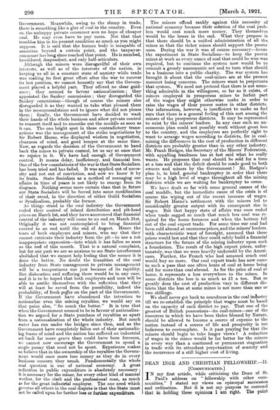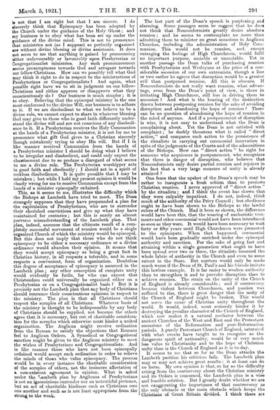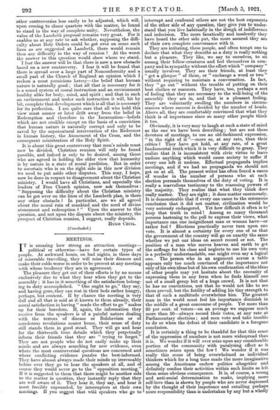I N my fi rst article, while criticizing the Dean of St.
Paul's address on " fellowship with other com- munities," I stated my views on episcopal succession and ordination. But it is not my purpose to contend that in holding these opinions I am right. The point Is not that I am right but that I am sincere. I do sincerely think that Episcopacy has been adopted by the Church under the guidance of the Holy Ghost ; and my business is to obey what has been set up under the guidance of the divine mind. This is not to pronounce that ministries not (as I suppose) so perfectly organized are without divine blessing or divine assistance. It does not seem to me that anything is gained by pronouncing either unfavourably or favourably upon Presbyterian or Congregationalist ministries. Any such pronouncement seems presumptuous towards God and arrogant towards our fellow-Christians. How can we possibly tell what God may think it right to do in respect to the ministrations of Presbyterians or Congregationalists ? And again, what possible right have we to sit in judgment on our fellow- Christians and either approve or disapprove what they conscientiously do ? Our business is much simpler ; it is to obey. Believing that the episcopal ministry is the one most conformed to the divine Will, our business is to adhere to it. If we are disobedient to what we believe to be a divine rule, we cannot expect to share in whatever blessing God may give to those who in good faith differently under- stand the divine will and are not conscious of any disobedi- ence to it. If a Presbyterian receives the Holy Communion at the hands of a Presbyterian minister, it is not for me to pronounce what gift God gives to a Christian sincerely though mistakenly trying to obey His will. But if I in like manner received Communion from the hands of a Presbyterian minister I should he doing what I believe to be irregular and disobedient, and could only expect the chastisement due to so profane, a disregard of what seems to me a divine rule.. The Presbyterian worshipper acts in good faith and obediently ; I should act in a spirit of reckless disobedience. It is quite possible that I may be mistaken ; but while I hold my, present opinion it would be clearly wrong for me to receive Communion except from the hands of a minister episcopally ordained. This, as it seems to me, illustrates the difficulty which the Bishops at Lambeth have. tried to. meet. The Dean strangely supposes that they have propounded a plan for the capitulation of Presbyterians, who are to surrender their cherished convictions and give up what they have maintained for centuries ; but this is surely an almost perverse misunderstanding of the, Lambeth plan. That plan, indeed,, assumes that the ultimate result of a com- pletely successful movement of reunion would be a single organized Church of which the ministry would be episcopal. But this does not imply- that those who do not think episcopacy to be either a necessary ordinance or a. divine ordinance would aband,on their opinion. It means that they would accept episcopacy as being a great fact in Christian history, in all respects a tolerable, and in some respects a convenient, form of organization. Doubtless this degree of acceptance of episcopacy is assumed in the Lambeth plan ; any other conception of complete unity would evidently be futile, for who can expect that Christendom could. universally be organized either on a Presbyterian or on a Congregationalist basis ? But it is precisely not the Lambeth plan that any body of Christians should renounce their conscientious opinions in respect to the ministry. The plan is that all Christians should respect the scruples of all Christians. Whatever basis of the ministry is thought to be indispensable by any body of Christians should be supplied, not because the others agree that it is necessary, but out of charitable considera- tion for the scruples which otherwise must hinder a united organization. Tho Anglican might receive ordination from the Roman to satisfy the objections that Romans feel to Anglican Orders. A Synodical or Congregational sanction might be given to the Anglican ministry to meet the wishes of Presbyterians and Congregationalists. And in like manner those who have not been episcopally ordained would accept such ordination in order to relieve the minds of those who value episcopacy. The process Would be in every instance the charitable consideration of the scruples of others, not the insincere affectation of a non-existent agreement in opinion., What is asked under the. TAnibeth plan by Anglicans of Presbyterians is not an ignominious, surrender nor an untruthful pretence, but an act of, charitable kindness such as Christians owe one another and such as is not least appropriate trona the etronik to the weak. The last part of the Dean's speech is perplexing and alarming. Some passages seem to suggest that he do es not think that Nonconformists greatly desire absolute reunion ; and he seems to contemplate no more than admitting them to minister on great occasions in Anglican Churches, including the administration of Holy Com- munion. This would not be reunion, and, except outraging the feelings of High Churchmen, would fulfil no important purpose, amiable or unamiable. Yet in another passage the Dean talks of purchasing reunion with Presbyterians and Wesleyans at the price of a con- siderable secession of our own extremists, though a line or two earlier ho agrees that disruption would be a greater evil than postponed reunion. All this is obscure. If Nonconformists do not really want reunion, what advan- tage, even from the Dean's point of view, is there in irritating High Churchmen, still less in driving them to secession ? And what is the bearing of the distinction drawn between postponing reunion for the sake of avoiding disruption and abandoning the hope of reunion ? There can be no question of abandoning the hope of reunion in the mind of anyone. And if a postponement of disruption is wise, it is not easy to understand what the Dean is complaining about. Yet the Dean is not satisfied with complaint ; he darkly threatens what is called " direct action," and compares such action to the persistence of the ritualists in carrying out ceremonial innovation in spite of the judgments of the Courts and of the admonitions of the Bishops. How can " direct action " be right for someone who acquiesces in postponement, who recognizes that there is danger of disruption, who believes that Nonconformists only desire partial reunion and rejoices in the fact that a very large measure of unity is already attained ?
One fears that the upshot of the Dean's speech may be rather to inaugurate a fresh schism than to promote Christian reunion. I never approved of " direct action " by the ritualists ; and I think the event has shown that they were culpably impatient. I do not, indeed, think much of the authority of the Privy Council ; but obedience ought to have been shown to the Bishops as the lawful rulers of the Church. Had it been so shown, the difference would have been this, that the wearing of eucharistic vest- ments and other ceremonial would not have been introduced so soon as they were. It would have been necessary to wait forty or fifty years until High Churchmen were promoted to the episcopate. When that happened, ceremonial would have been gradually enriched under due episcopal authority and sanction. For the sake of going fast and attaining within a singlegeneration what ought to have been spread over two or tree, the ritualists loosened the whole fabric of authority in the Church and even to some extent in the State. But matters would only be made much worse if the Dean of St. Paul's and his friends imitate this lawless example. It is far easier to weaken authority than to strengthen it and to provoke disruption than to achieve reunion. The strain on the unity of the Church of England is already considerable ; and if controversy beeamo violent between Churchmen, and passion was suffered to rise, there is great danger that the unity of the Church of England might be broken. This would not serve the cause of Christian unity throughout the world. It would, indeed, most seriously hinder it by destroying the peculiar character of the Church of England, which now makes it a natural mediator between the ancient Churches of the West and East and the Protestant secessions of the Reformation and post-Reformation periods. A purely Protestant Church of England, saturated with what events have taught us to recognize as the dangerous spirit of nationality, would be of very much less value to Christianity and to the hope of Christian unity than is the Church of England as it is to-day. It seems to me that so far as the Dean attacks the Lambeth position his criticism fails. The Lambeth plan may oz may not achieve great results : it at least can do no harm. My own opinion is that, so far as the difficulty arising from the controversy about the Christian ministry and its Orders is concerned, the Lambeth plan is a wise and feasible solution. But I greatly doubt whether we are not exaggerating the importance of that controversy as the only obstacle or the main obstacle which keeps the Christians of Great Britain divided.. I think there are other controversies less easily to be adjusted, which will, upon coming to closer quarters with the matter, be found to stand in the way of complete unity. Nevertheless, the value of the Lambeth proposal remains very great. For it enables us at any rate to ask whether, supposing the diffi- culty about Holy Orders could be got over on some such lines as are suggested at Lambeth, there would remain then any difficulty in the way of reunion ? At the worst the answer to this question would show where we stand.
I fear the answer will be that there is now a. new obstacle based on a new controversy. I fear it will be found that there is spread over a large part of Nonconformity and a small part of the Church of England an opinion which I reckon a most pernicious heresy—the belief that human nature is naturally good ; that all that is necessary for it is a sound system of moral instruction and an environment healthy alike for body, mind, and spirit ; and that in such an environment and under such instruction it will, bit by bit, complete that development which is all that is necessary for its perfection. I am quite sure that all who hold this view must sooner or later drift away from the belief in Redemption and therefore in the Incarnation—beliefs which are not credible except on the basis of a conviction that human nature is naturally corrupt and only to be saved by the supernatural intervention of the Redeemer in human history, the Atonement of the Cross, and the consequent ministration of the Holy Spirit.
It is about this great controversy that men's minds must now be divided. Christian reunion will only be found possible, and indeed is only to be desired, among those who are agreed in holding the older view that humanity is by nature in a state of moral perdition. But in order to ascertain who is on the right side in this new division we need to put aside other disputes. This may, I hope, now be done in respect to disagreement about the Christian ministry. I would have all Christians, and especially the leaders of Free Church opinion, now ask themselves : " Supposing the difficulty about the Christian ministry can be got over on the lines of the Lambeth plan, is there any other obstacle ? In particular, are we all agreed about the moral ruin of mankind and the need of divine atonement and redemption ? " Upon the answer to this question, and not upon the dispute about the ministry, the prospect of Christian reunion, I suggest, really depends.
(Concluded.)
HUGH CECIL.




































 Previous page
Previous page